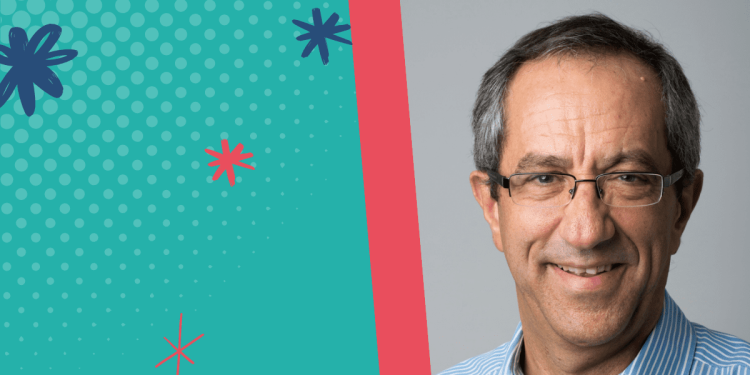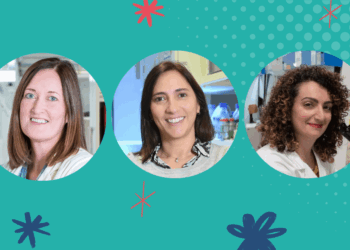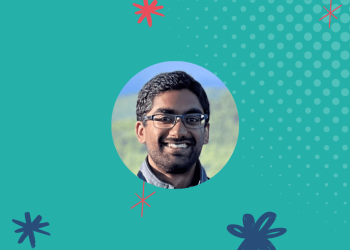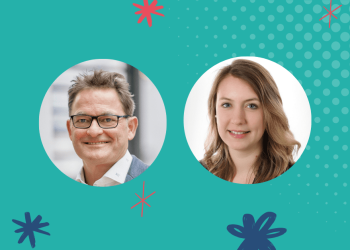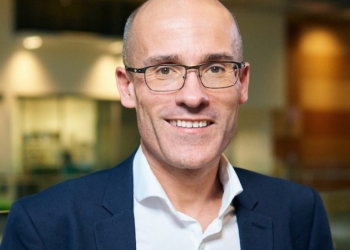In this episode of The Cancer Researcher Podcast, we welcome back Professor Carlos Caldas, Clinician Scientist and Professor of Cancer Medicine at the University of Cambridge. As a keynote speaker at the upcoming EACR Congress, he shares insights into his breast cancer research, the evolution of cancer science, and the power of patient-derived xenograft models. We also discuss the Congress programme, networking tips for early-career researchers, and why Lisbon is the perfect host city.
Hosted by the EACR Scientific Officer, Alexandra Boitor.
Listen here, scroll down for the transcript and subscribe now via Spotify, Apple Podcasts, Amazon Music/Audible, Deezer or YouTube so you’ll never miss an episode. You can find all episodes and their transcripts here.
Episode transcript
Alexandra: I’m glad you were able to accept our invitation once again. The last time we spoke, we focused on your career path. The conversation can be found in episode 3 of The Cancer Researcher Podcast. We discussed how starting on your clinical journey, you were profoundly impacted by the environment around you, reach in molecular medicine, during your residency years, and that ignited your curiosity and love for research, or at least that was my understanding from our conversation.
One thing that I missed the opportunity of asking you back then is how did you define your research interest? What drew you towards cancer research and specifically towards the field of breast cancer research?
Carlos: Well, the reason why I decided cancer research is that it was where I felt the molecular revolution in medicine was going to first have an impact, both in understanding the biology of the disease and also in devising better treatments and more individualised treatments. So that was what took me to want to do research in cancer. And then breast cancer in particular because I wanted to focus on a common disease. Breast cancer affects one in eight women in the Western world. Also a cancer that has very variegated clinical outcome and that can only be explained by the biology. And so that’s why I decided to go to breast cancer research.,
Alexandra: What would you say are the major changes you noticed in the cancer research field since you started working in it? How did life as a researcher change?
Carlos: Well I think, you know, two or three things. One is the amazing development of technologies. So, for example, the advent of next generation sequencing has made it possible during my scientific lifetime to go from single genes to really, without thinking twice, tackling cancers at the whole genome level. And technologies have continued to evolve with then single cell technologies and more recently spatial biology. So this has really revolutionised our understanding of cancer, in general and in breast cancer in particular.
Then the second thing, is the multidisciplinarity. You know, the fact that cancer researchers increasingly work together with the exact sciences, you know, physics, mathematics, even engineering.
And then I would say the third biggest, transformation has been team science. I think that increasingly we realise that to tackle, in particular diseases such as cancer, you need large teams of people, multidisciplinary teams, and therefore small labs are less likely to succeed. And this is a change in culture. How do you give credit to individuals if they are part of teams, et cetera.
Alexandra: All these three things reflect very well in your research and in the way that you build your research group.
Carlos: I think that’s true. Humbly, I’m glad that you observe that and I feel very proud of it. Yes, tackling new technologies, being multidisciplinary and reaching out to the exact sciences, and then being part of teams, sometimes leading the team, sometimes being part of the teams and not leading them. I embrace these three aspects.
Alexandra: I’ve seen some of the talks you’ve given at various conferences over the past few years, and they are always captivating, I think one of the reasons, in addition to the scientific excellence, of course, is how resounding your passion for your research is. By studying and analysing the genome and transcriptome of tumours, your approach to understanding breast cancer is holistic in a way.
Your lab is interested in different aspects of breast cancer, etiology, diagnosis and treatment including: different subtypes of breast cancer, how this taxonomy influences clinical care, environmental factors in oncology, circulating plasma cells, free tumour DNA as a marker of tumour burden. What would you say is your favourite research question or project that you have worked on?
Carlos: That’s a tough one because as you pointed out, I have enormous enthusiasm for what I do and I’m driven by curiosity and discovery. I think the translational research will dry out unless you keep making discoveries and being curiosity-driven and not worrying so much about application.
And that’s where I think EACR is a champion of curiosity-driven research. That’s why I’m so keen to be involved in the organisation. I’ve been involved for many years. So a favourite. Well, I’m always thinking not what I’ve done in the past, but what I’m planning to do in the future, and it’s really now, tackling tumours as ecosystems and cellular ecosystems, and really getting at the mechanics as why is it that these ecosystems are organised?
Because, contrary to what a lot of people think of cancers as disorganised tissues, they are not. They are highly organised. They are disorganised compared with normal tissues, but they have their own intrinsic organisation. And understanding how tumour cells instruct their own tumour microenvironment and actually the macro environment, which we increasingly realise that cancer has effects at the organismal level. So that’s where my science is going and so that’s what I have more passion for right now because that’s what I’m doing now I’m going to be doing in the future.
Alexandra: And are you planning on sharing some of these new or exciting data from this project, and I would dare to say new approach to research for you and your lab, with us at the EACR Congress in June?
Carlos: I am very humbled and very proud that I am the closing keynote speaker. We have to put here a word for EMBO because it’s the EMBO keynote at the Congress and EMBO partners with the EACR and funds it.
Alexandra: Absolutely! We thank EMBO for supporting this keynote lecture.
Carlos: So I have the privilege of giving the closing keynote. I hope that by then there will still be lots of people around enthusiastic about the science and enjoying EACR 2025 all the way to the end. I’m going to do a mixture of two things. I’m going to present kind of if you want an overview of breast cancer and our contributions, and those of others, but I’ll focus it on our contributions to breast cancer in the last 20 years. And then I’m going to be talking about what lies ahead and what my lab, and what I think the key questions are in breast cancer for the next 10 years.
Alexandra: I have to say these are my favourite type of lectures at the Congress and I think they’re very useful for more novice researchers, and novice people to the field, or those that work in similar fields, but not exactly the one that the lecture is in. I’m really looking forward to learning more about breast cancer research in general and your research in particular. It sounds really interesting so I can’t wait to find out more. There are only a few months left now. Your keynote lecture is most certainly one of my highlights for the Congress to come, but to reverse the question, could you share with us one thing that you are looking forward to at the EACR Congress?
Carlos: Well, to be honest, I think the program is, and I’m biased here because I’m on the organising committee, is really an amazing program. I think our Congress, year on year, just keeps challenging itself and trying to organise a Congress that is better than the last one scientifically.
Lisbon is a great city. It’s my home city. I have been away for a long time, but always go back and it will be a great place to have the meeting. Fantastic weather, fantastic food. But the Congress itself is really amazing. I would say, throughout the breadth of the Congress, we have fantastic keynote speakers. Then we have what I really like. Before the Congress, we really focus on young scientists and people early in their career, and they have a dedicated pre Congress if you want, but then during the Congress there will be multiple talks by junior PIs. I like the focussed symposia that will occur in parallel sessions. I think that it’s fascinating you go all the way from amazing symposia on single cells to spatial biology, to cancer metabolism, to how do you develop new cancer drugs, tumour immunology.
I think we have really a high quality Congress and I have no doubts that it is the top cancer Congress in Europe. I hope it will be very well attended, and I hope people really enjoy and learn. A tradition of our congresses is that they are large, but not so large that people cannot interact. So we value enormously the interaction.
We really encourage the speakers to stay for the whole Congress so that they can interact with young people. And I have to say that a lot of the speakers do that and buy into the spirit of the EACR in this. So, I can’t wait to reach June and having, you know, a Congress full of enthusiasm, full of fantastic new science, seeing new careers burgeoning and appearing and becoming famous because they do great science.
Alexandra: I agree, I think it’s a great opportunity for everyone to learn from everyone. Younger researchers especially from the invited speakers, but maybe there’s a bit of an opportunity for more seasoned researchers to find out some things that maybe they’re not up to speed with.
Now that I have you here, I can’t let you go without asking you to tell us about the power and the promise of patient derived xenograft models. I notice they are absolutely central to your work, and I would dare to say you are an advocate for these cancer models.
Carlos: Well yes, I think models are models, but the research of my group, and other groups in other tumour types, have shown the same. Xenografts are the closest approximation to human tumours. Now, of course, they have the big disadvantage of not having the recipient. Mice don’t have a proper immune system, but that can be repaired if you want.
And we could talk about that for a whole hour. You know, the xenografts, what is remarkable about them is that they are genocopies of the originating tumour. That means that they retain clonal heterogeneity. They are also phenocopies, in the sense that they keep very similar cell types, even in the mouse.
And remarkably, they are also phenocopies of the tumour architecture. This is absolutely extraordinary. So you put a xenograft in a mouse and the only cells, human cells, that grow are the tumour cells. All of the tumour microenvironment, the blood vessels, the fibroblasts are of mouse origin. And despite that, when you look at it morphologically, it is nearly indistinguishable at the tissue level and at the cell organisation level.
And this is extraordinary because now you have a tool that you can use with perturbations, not only in the cell autonomous compartment, but in the tumour microenvironment. The other things that you can do is because you can track cells with, for example, antiviral barcodes, you can now track the progeny of individual cells.
So now you’re tracking cell clones. All cells with the same barcode are derived from an original same cell. So they are daughters of an original cell. And you can now start studying things such as tumour dormancy, drug resistance, drug tolerant persister cells, metastases, et cetera. And then finally xenografts allow you to study tumours at the organismal level, not just the tumour microenvironment, but the tumour macroenvironment.
The effect of tumours on rewiring, for example, liver metabolism, understanding systemic responses et cetera. And that’s why my lab is going to be focusing more and more in using these xenografts because this aspect that they mimic so well. And the other thing that they allows us to do, I use the term earlier, instruction.
So tumour cells instruct their own tumour microenvironment. And so we now have a handle on understanding what is this instruction. What are the molecules, microvesicles, et cetera, that mediate this instruction. And this is crucial to understand how tumour ecosystems are established and maintained. And eventually, this will lead us to developing new therapeutic strategies, et cetera.
Alexandra: When you talk about PDX models, I presume you mostly talk about mouse PDX models, similar to those that you use in your own research. I would be interested in finding your opinion on the use of perhaps a less popular approach, PDX models developed in chick embryos.
Carlos: Well, chick embryos is one. The other is in zebrafish. So these are again models. They have the advantage of being cheaper and easier to handle than mice colonies, which are very expensive. And they allow you to do sophisticated imaging, live imaging, etc. So, these are model systems and as organoids are and organoids can get more complex people can now make organoids where they add tumour microenvironment components to it. We’ll be hearing some of this at the Congress and maybe for our next Congress. I’m already thinking ahead to after Lisbon. This, will be something that we’ll dedicate one or more sessions to. New models of cancer and how they can be used to study the biology and to develop new therapeutic approaches.
Alexandra: I have to say that I find this topic of generating cancer models for research extremely interesting. The molecular complexities behind developing the models, the pros and cons for each one of them, and their suitability for addressing different research questions, it’s fascinating, at least to me.
I am most certainly looking forward to your talk at the EACR Congress to learn more about the use of PDX models and to some of the symposia at the Congress that, as you mentioned, focus on cancer models, such as the symposia on novel models of cancer cachexia, and the one on advanced in vitro models.
Personally, I can’t wait to learn more about this topic. Many other talks at the Congress will, of course, touch on this subject and I’m looking forward to learn more from the proffered papers and during the poster session as well. So, if you are using or working on developing an interesting cancer model, don’t hesitate to submit your abstract. Abstract submission is open until 06 March 2025. Check the programme to discover all the topics that will be discussed during the EACR Congress on 16-19 June in Lisbon.
Now that we’re back talking about the Congress, Carlos, do you have one piece of advice for our audience, especially early career researchers, on how to effectively network at a conference? And I’m thinking particularly at bigger events like the EACR Congress, for instance, that have a full-on schedule with presentations running in parallel tracks, large exhibition areas, and that ultimately bring thousands of people together.
Carlos: I think like everything, it is all about planning. So if you are going completely on your own, prepare. Look at the program, find the things that you are interested in, but I would challenge you also to go to things that you don’t think you have a direct interest, because that’s where a lot of the best ideas come from.
If you are a member of a lab, and other lab members are going, organise yourself with your colleagues. Don’t all go to the same talks. Just try to cover the Congress by planning between members of the lab, so that you cover as much of the Congress as you can, and then you take notes, and when you go back to your lab and to your institute, you’ll have three or four or five weeks where you can use that at lab meetings to say, well, this is what I liked in the Congress, and different members of the lab would have seen different things.
The other thing is that it is, for us, our largest meeting, but if you compare it with other organisations meetings, particularly the ones in the United States, which are gigantic, and it’s really nearly impossible to try to embrace it all. We are large, but not so large that you can not kind of grasp what the Congress is about and still have the chance to go and talk, either in the smaller sessions or even in the plenary keynote sessions, to talk with individual people and with the researcher that you always thought you needed to talk to. People are very informal. You’ll see at our congress long lines of people that after the talk finishes want to come and talk in person with the speaker. Take advantage of that. Take advantage of the breakouts and the social programme.
Alexandra: And finally, can you share with us one interesting thing about Lisbon, or one interesting thing to do in Lisbon? I mean beyond the obvious touristy choices, I’m looking for the advice coming from a local.
Carlos: Well, I am a keen walker in cities. Now, Lisbon is the city of the seven hills. So it’s going uphill and coming downhill. In June, the weather will be very pleasant. There might be some very hot days, but not as hot as July or August. I would strongly encourage people to walk around, and then if you want to have an experience that is unique to Lisbon, take one of the historic trams, the yellow trams that go on tram tracks in Lisbon. And those go through the historic part of Lisbon up to the borough of the Roman times, to the castle and go to that part of the city, the oldest part of the city. Also walk along the riverfront because it’s a beautiful riverfront, a large estuary. The Romans called it the little Mediterranean, so just enjoy the city and enjoy the outdoors and there are very nice museums in Lisbon, Lisbon is a city of light and it is a city by the sea and by the river. Take advantage of that.
Alexandra: I find it’s often the most valuable when you get advice from someone that’s lived in that city and knows it well. So I most certainly plan on taking your advice and do my best to enjoy the city outdoors as much as I can when I’m there.
So, thank you, Carlos, for joining us for this short conversation. We really appreciate you sharing a few details from your research and your research interests, and also a few tips on what to do at the Congress and in Lisbon.
Carlos: Thank you very much, and I hope it’s useful!
Enjoyed it? Stay curious with The Cancer Researcher Podcast. Subscribe now via Spotify, Apple Podcasts, Amazon Music/Audible, Deezer or YouTube so you’ll never miss an episode. You can find all episodes and their transcripts here.
Suggest a topic for a future episode: What would you love to learn more about? Click here to give us your topic suggestions in a short online form. We warmly welcome your ideas and input!


